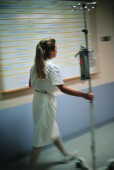
TUESDAY, July 31 (HealthDay News) — Burnout among nurses is linked to an increase in hospital infection rates, researchers have found.
In addition, job-related exhaustion among nursing staff costs millions of health care dollars each year, according to the study from the Center for Health Outcomes and Policy Research at the University of Pennsylvania School of Nursing.
In conducting the study, the researchers analyzed data from the Pennsylvania Health Care Cost Containment Council and the American Hospital Association Annual Survey. They also examined a 2006 survey of more than 7,000 registered nurses from 161 Pennsylvania hospitals that provided insight into their job-related attitudes, including feelings on depersonalization and personal accomplishment. The survey also revealed the nurses’ levels of emotional exhaustion, which is a key factor in burnout syndrome.
The study showed that among nurses caring for an average of 5.7 patients, for every additional patient they were assigned there was roughly one additional catheter-associated urinary tract infection per 1,000 patients. This translates to 1,351 more infections every year, according to study co-author Jeannie Cimiotti of the New Jersey Collaborating Center for Nursing and Rutgers School of Nursing in Newark, N.J., and her colleagues at the University of Pennsylvania School of Nursing.
Each 10 percent increase in a hospital’s high-burnout nurses was associated with almost one more catheter-related infection and two more surgical site infections for every 1,000 patients each year, the investigators noted in a news release from the Association for Professionals in Infection Control.
Catheter-related urinary tract infections cost an average of $749 to $832 each, and surgical site infections can cost up to $29,443. Based on those figures, the researchers projected that 4,160 infections could be prevented and hospitals could save $41 million by reducing rates of nursing staff burnout to 10 percent from an average of 30 percent.
“Health care facilities can improve nurse staffing and other elements of the care environment and alleviate job-related burnout in nurses at a much lower cost than those associated with health care-associated infections,” Cimiotti and colleagues concluded. “By reducing nurse burnout, we can improve the well-being of nurses while improving the quality of patient care.”
The study was published in the August issue of the American Journal of Infection Control.
While the study uncovered an association between nursing staff burnout and infections among patients, it did not prove a cause-and-effect relationship.
More information
The U.S. Centers for Disease Control and Prevention has more about health care-related infections.

